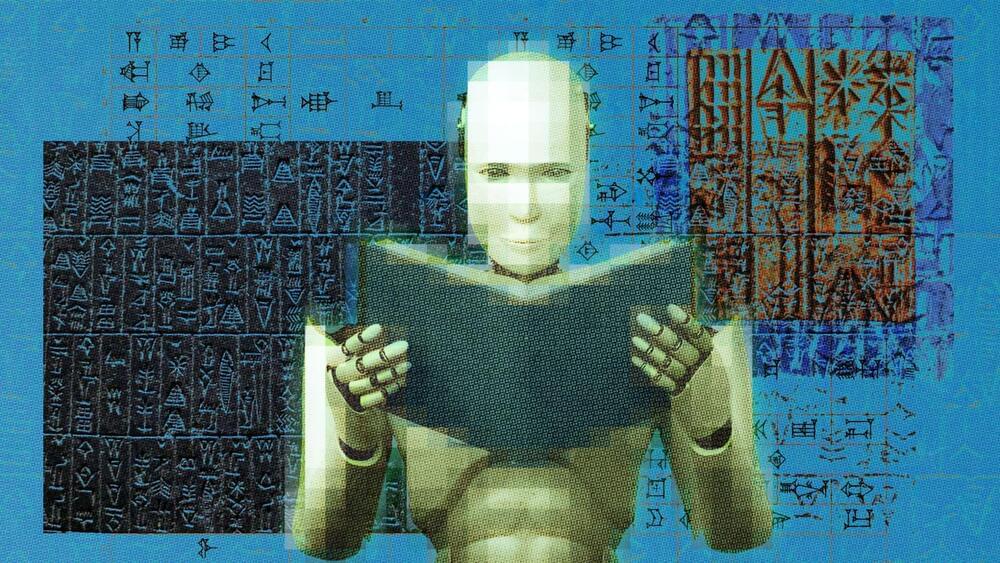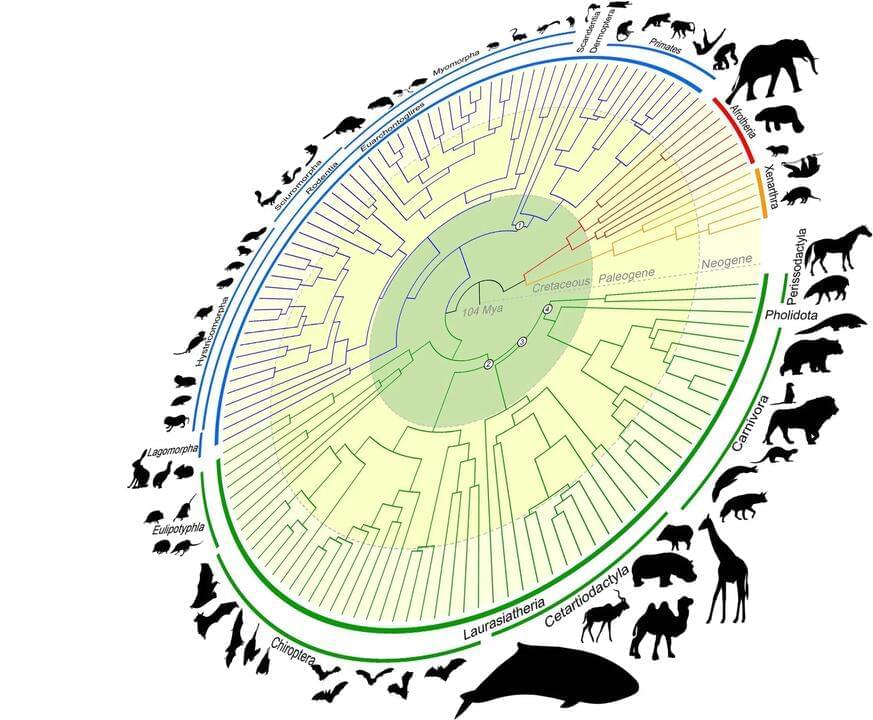Time travelers might want to keep this one handy.



The research uses the genomes of 241 species.
A species is a group of living organisms that share a set of common characteristics and are able to breed and produce fertile offspring. The concept of a species is important in biology as it is used to classify and organize the diversity of life. There are different ways to define a species, but the most widely accepted one is the biological species concept, which defines a species as a group of organisms that can interbreed and produce viable offspring in nature. This definition is widely used in evolutionary biology and ecology to identify and classify living organisms.

Created using Paragraph ai.
Time travel has long been a popular theme in movies, but scientists believe that the concept of time teleportation is unlikely in reality. However, they do not dismiss the possibility of time travel altogether. The laws of physics suggest that time travel may be possible, but the details are complex.
Physicists explain that traveling to the near future is relatively simple, as we are all doing it right now at a rate of one second per second. Additionally, Einstein’s special theory of relativity states that the speed at which we move affects the flow of time. In other words, the faster we travel, the slower time passes. Furthermore, Einstein’s general theory of relativity suggests that gravity also impacts the flow of time. The stronger the nearby gravity, the slower time goes.
In this episode, I discuss how our brain and body track time and the role that neurochemicals, in particular dopamine and serotonin, but also hormones such as melatonin, allow us to orient ourselves in time. I review the three types of time perception: of the past, of the present, and the future, and how dopamine and serotonin adjust both our perception of the speed of the passage of time and our memory of how long previous experiences lasted. I also discuss circannual entrainment, which is the process by which our brain and body are matched to the seasons, and circadian (24 hours) entrainment, both of which subconsciously adjust our perceived measurement of time. I explain the mechanisms of that subconscious control. And I cover the ultradian (90 minutes) rhythms that govern our ability to focus, including how to track when these 90-minute rhythms begin and end for the sake of work and productivity. I include ten tools based on the science of time perception that you can apply to enhance productivity, creativity, and relationships in various contexts.
Thank you to our sponsors:
ROKA — https://www.roka.com — code “huberman“
Athletic Greens — https://www.athleticgreens.com/huberman.
InsideTracker — https://www.insidetracker.com/huberman.
Our Patreon page:
https://www.patreon.com/andrewhuberman.
Supplements from Thorne:
http://www.thorne.com/u/huberman.
Social:
Instagram — https://www.instagram.com/hubermanlab.
Twitter — https://twitter.com/hubermanlab.
Facebook — https://www.facebook.com/hubermanlab.
Website — https://hubermanlab.com.
Newsletter — https://hubermanlab.com/neural-network.
Timestamps:
Story of the distant Future.
“Able to journey “out of the body” the time traveller whirls through space and time seeking the Starmaker of the cosmos. He visits many worlds, often during periods of social and political crisis, and finally joins others travellers in developing an unusual mental community.“
Chapter list:
00:00:00 — (i) Book info.
00:04:00 — (00) Preface.
00:10:39 — (01) The Earth.
00:30:35 — (02) Interstellar Travel.
00:55:20 — (03) The Other Earth.
02:05:33 — (04) I Travel Again.
02:26:05 — (05) Worlds Innumerable.
03:18:04 — (06) Intimations of the Star Maker.
03:31:22 — (07) More Worlds.
04:38:07 — (08) Concerning the Explorers.
04:48:59 — (09) The Community of Worlds.
06:14:26 — (10) A Vision of the Galaxy.
06:35:13 — (11) Stars and Vermin.
07:21:35 — (12) A Stunted Cosmical Spirit.
07:27:46 — (13) The Beginning and the End.
08:07:41 — (14) The Myth of Creation.
08:15:30 — (15) The Maker and His Works.
09:01:25 — (16) Epilogue: Back.
Like these books? Want to help?
These books come from the National Library Services.
I encourage you to donate:
https://www.loc.gov/nls/about/donate/
The first 100 people to use code UNIVERSE at the link below will get 60% off of Incogni: https://incogni.com/universe.
Researched and Written by Colin Stuart.
Check out his superb Astrophysics for Beginners course here: https://www.colinstuart.net/astrophysics-course-for-beginner…on-online/
Edited by Manuel Rubio.
Narrated and Script Edited by David Kelly.
Thumbnail art by Ettore Mazza, the GOAT: https://www.instagram.com/ettore.mazza/?hl=en.
Animations by Jero Squartini https://fiverr.com/freelancers/jerosq.
Stock footage taken from Videoblocks and Artgrid, music from Epidemic Sound, Artlist, Silver Maple and Yehezkel Raz.
Space imagery also used from NASA and ESO.
Specific image credits:
AT Service via Wikimedia for images of Kip Thorne and Bryce DeWitt.
Massachusetts Institute of Technology, via Wikimedia Commons for the image of Bruno Rossi.
00:00 Introduction.
06:00 The Block Universe.
16:25 Visiting The Future.
27:00 Visiting The Past.
37:59 Time Streams.
#wormhole #quantum
There are loopholes.
Try out my quantum mechanics course (and many others on math and science) on Brilliant using the link https://brilliant.org/sabine. You can get started for free, and the first 200 will get 20% off the annual premium subscription.
If you’ve been following my channel for a really long time, you might remember that some years ago I made a video about whether faster-than-light travel is possible. I was trying to explain why the arguments saying it’s impossible are inconclusive and we shouldn’t throw out the possibility too quickly, but I’m afraid I didn’t make my case very well. This video is a second attempt. Hopefully this time it’ll come across more clearly!
💌 Support us on Donatebox ➜ https://donorbox.org/swtg.
👉 Transcript and References on Patreon ➜ https://www.patreon.com/Sabine.
📩 Sign up for my weekly science newsletter. It’s free! ➜ https://sabinehossenfelder.com/newsletter/
🔗 Join this channel to get access to perks ➜
https://www.youtube.com/channel/UC1yNl2E66ZzKApQdRuTQ4tw/join.
00:00 Intro.
Is time travel FINALLY possible?? Join us… and find out!
Subscribe: https://wmojo.com/unveiled-subscribe.
In this video, Unveiled takes a closer look at 3 groundbreaking experiments in time travel and quantum computing! On an international scale, science is starting show how moving forward and back in time really COULD be possible… all it will take is a little manipulation at the atomic and subatomic levels!
This is Unveiled, giving you incredible answers to extraordinary questions!
Find more amazing videos for your curiosity here:
6 Scientific Breakthroughs Predicted During Your Lifetime — https://youtu.be/wGKj-3AfxdE
Are We the Creation of a Type V Civilization? — https://youtu.be/T_u4lGDs3dM
0:00 Intro.

Retrocausality, a mind-blowing quantum concept, proposes that future events impact the past. Challenging time’s traditional flow and exploring interconnected temporal relationships. Can the universe communicate with its past-self?
0:00 What is Retrocausality?
00:55 The Layers of the Universe.
02:17 The Universe Is Not Real.
04:32 The Role of Quantum Entanglement.
08:02 Does Time Travel Explain the Mysteries of the Universe?
#retrocausality #timetravel #quantummechanics.
Interested in what I do? Sign up to my Newsletter.
100% free forever and good for the environment.
https://drbenmiles.substack.com/
My Links:
https://www.instagram.com/drbenmiles/
A few people have asked so I’ve added the info below. Some of these are affiliate links. If you make a purchase it doesn’t cost you anything extra, but a percentage of the sale will help support this channel and my work to bringing entrepreneurship into science.